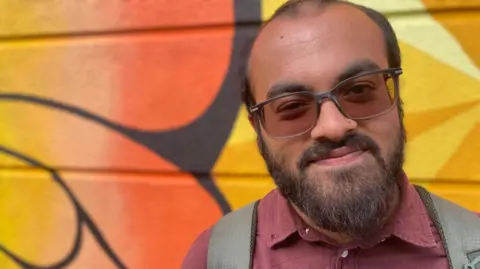Education producer
 BBC / Kate McGough
BBC / Kate McGough“I’ve applied for factories, care work, hospital work – anything to just get a job to support me and my son,” says 20-year-old mum Libby.
She says she’s sent hundreds of job applications to employers in Grimsby, Lincolnshire, with no success.
“I’ve walked around the shops, gone into businesses giving out my CV,” she tells the BBC.
“Day to day it is depressing, because you don’t hear anything back, you’re constantly trying to find a job, trying to fight for a job, and you hear nothing.”
She is one of 923,000 16-24-year-olds estimated to have been not in education, employment or training – Neet – in the first three months of 2025, according to new figures from the Office for National Statistics (ONS).
That equates to roughly one in eight people aged 16 to 24.
Although Friday’s Neets figures show a slight decrease on the same period last year, Work and Pensions Secretary Liz Kendall says “there are still nearly a million young people locked out of the system and being written off”.
The ONS publishes estimates on Neets every three months, with February’s figures showing an 11-year high of 987,000.
Libby is now doing a first aid course at a local charity centre, having been referred there by a job centre, with the aim of pursuing her dream of running her own dog grooming business.
But Grimsby has lower rates of employment for all adults than the national average, making it harder for young people there to find work.
 BBC / Kate McGough
BBC / Kate McGough‘I’m not asking to be Prime Minister’
Curtis, 22, is doing the same first aid course as Libby. He is on Universal Credit while looking for work and says he has also applied for hundreds of jobs.
“I don’t want to be unemployed,” he says.
“I’m sick of feeling like I have a lack of purpose. I want to work on a forklift or work in a shop doing customer service. It’s not like I’m asking to be Prime Minister.”
The ONS produces its estimates from its Labour Force Survey. The survey has seen fewer people respond in recent years, which makes the results more volatile than they were previously.
The majority of young people who are Neet in the latest figures are economically inactive (569,000), meaning they are not actively seeking work, compared to 354,000 who are unemployed but actively looking for jobs.
The number of economically inactive young people is down 29,000 on the same period last year, but the number of unemployed people looking for work has increased by 21,000.
A rise in long-term sickness among young people has been one of the main causes of economic inactivity over the past three years, according to analysis of previous ONS stats by the Youth Futures Foundation.
And in 2023, almost one out of every five young people who were Neet (19.5%) had a mental health condition, according to the latest yearly Department for Education figures.
One area experiencing these issues is Cornwall, where seasonal work, unaffordable housing and a lack of accessible mental health support are all hurdles for young people in finding work.
Tegan, from Newquay, has been economically inactive for some time after she never passed her maths and English GCSEs, having struggled for years with her mental health.
“It’s meant that I’ve been left in this really quite big void of not really knowing how to get back into life, how to get back into education,” the 23-year-old says.
 BBC / Dan Nelson
BBC / Dan Nelson“It’s really difficult when you’re trying to recover and get yourself back on track, and as well as doing that you have to fight your way through a system that isn’t all that supportive.”
She is now being supported by a mental health charity offering care in the community, and plans to go to college and pass those GCSEs.
Even for people who have been to university, though, there is no guarantee of a job. Graduates make up 10.6% of Friday’s Neet figures, equivalent to about 90,000 young people, according to analysis by the Youth Futures Foundation.
Inaz Hussain, who lives in Bristol, graduated in 2022 with a degree in film production but has been unemployed for six months, despite previously getting a few short-term contracts and internships.
He is now applying for jobs in marketing, communications, retail and hospitality.
“Yes I got a degree, but what can I show for it?” he says.
 BBC / Dan Nelson
BBC / Dan Nelson“I’ve lost track of how many jobs I’ve applied to.”
He thinks older generations need to be more understanding of the difficulties young people face in finding a job.
“We just hear that we’re lazy, we’re not resilient,” he says. “I’ve been trying to do the right thing and it’s a bit of a kick in the teeth.”
Kendall argues that the decrease in Neets represents “progress”, but she is “determined to change” the overall number which remains high.
She says the government is investing £45m in a youth guarantee “to give every young person the chance to get on in life”.
The trickier challenge will be tackling the number of young people who are not looking for work at all, a complex issue involving many factors.






